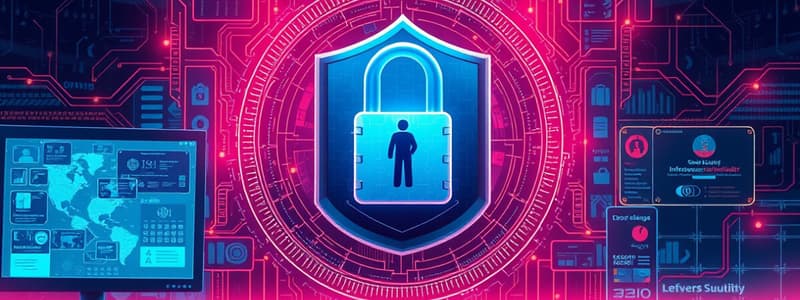Podcast
Questions and Answers
What are the primary goals of security operations and administration?
What are the primary goals of security operations and administration?
- Confidentiality
- Integrity
- Availability
- All of the above (correct)
Shared or generic accounts should be avoided.
Shared or generic accounts should be avoided.
True (A)
What does the principle of 'need to know' limit?
What does the principle of 'need to know' limit?
- User permissions
- System security
- Data storage
- Information access (correct)
The ____ should not possess two permissions that allow them to perform a sensitive operation.
The ____ should not possess two permissions that allow them to perform a sensitive operation.
Who has total responsibility for data assets?
Who has total responsibility for data assets?
Security controls are not important for protecting information.
Security controls are not important for protecting information.
What are the primary goals of security operations and administration?
What are the primary goals of security operations and administration?
Which of the following are prerequisites for ensuring accountability? (Select all that apply)
Which of the following are prerequisites for ensuring accountability? (Select all that apply)
What is the least privilege principle?
What is the least privilege principle?
Which role is responsible for managing the day-to-day data governance activities?
Which role is responsible for managing the day-to-day data governance activities?
Ethical practices in security should protect society, public trust, and _____ .
Ethical practices in security should protect society, public trust, and _____ .
Match the following Data Security Roles with their descriptions:
Match the following Data Security Roles with their descriptions:
Flashcards are hidden until you start studying
Study Notes
Security Operations and Administration
- Involves identifying information assets, implementing policies, standards, procedures, and guidelines.
- Aims to ensure confidentiality, integrity, and availability (CIA) of information.
Accountability
- Traces actions on a system to individual users, preventing denial of responsibility.
- Prerequisites for accountability include:
- Identification: Unique identifiers (e.g., usernames) for each user; avoid shared or generic accounts.
- Authentication: Strong methods to prevent unauthorized access and user denial.
Key Principles of Information Security
- Need to Know: Limits information access based on valid business needs; not every individual with clearance can access sensitive data.
- Least Privilege: Provides minimum necessary permissions for job functions; organizations can utilize emergency access procedures for IT staff.
- Separation of Duties: Combines sensitive permissions held by different individuals/groups to prevent misuse; audits verify compliance.
Data Security Roles
- Data Owner: Senior official responsible for data assets; sets policies and guidelines.
- Example: Vice President for Human Resources managing employment data.
- Data Stewards: Manage daily data governance and decide data access.
- Data Custodian: IT staff responsible for storage and processing of information.
- Data Users: Regular users of data (e.g., analysts, managers) who must protect data from unauthorized access and adhere to rules established by data owners and stewards.
Limiting Data Collection
- Reduces risks of information misuse or loss; follows privacy principles.
- Organizations must inform individuals about data collection and usage, and obtain consent.
- New consent is needed before collecting additional information beyond disclosed purposes.
Code of Ethics Overview
- Focuses on protecting society and public trust, acting honorably and responsibly.
- Promotes diligent service and advancing the profession.
Security Controls
- Procedures and mechanisms designed to safeguard information and ensure compliance with security standards.
Security Operations and Administration
- Involves identifying information assets, implementing policies, standards, procedures, and guidelines.
- Aims to ensure confidentiality, integrity, and availability (CIA) of information.
Accountability
- Traces actions on a system to individual users, preventing denial of responsibility.
- Prerequisites for accountability include:
- Identification: Unique identifiers (e.g., usernames) for each user; avoid shared or generic accounts.
- Authentication: Strong methods to prevent unauthorized access and user denial.
Key Principles of Information Security
- Need to Know: Limits information access based on valid business needs; not every individual with clearance can access sensitive data.
- Least Privilege: Provides minimum necessary permissions for job functions; organizations can utilize emergency access procedures for IT staff.
- Separation of Duties: Combines sensitive permissions held by different individuals/groups to prevent misuse; audits verify compliance.
Data Security Roles
- Data Owner: Senior official responsible for data assets; sets policies and guidelines.
- Example: Vice President for Human Resources managing employment data.
- Data Stewards: Manage daily data governance and decide data access.
- Data Custodian: IT staff responsible for storage and processing of information.
- Data Users: Regular users of data (e.g., analysts, managers) who must protect data from unauthorized access and adhere to rules established by data owners and stewards.
Limiting Data Collection
- Reduces risks of information misuse or loss; follows privacy principles.
- Organizations must inform individuals about data collection and usage, and obtain consent.
- New consent is needed before collecting additional information beyond disclosed purposes.
Code of Ethics Overview
- Focuses on protecting society and public trust, acting honorably and responsibly.
- Promotes diligent service and advancing the profession.
Security Controls
- Procedures and mechanisms designed to safeguard information and ensure compliance with security standards.
Studying That Suits You
Use AI to generate personalized quizzes and flashcards to suit your learning preferences.




